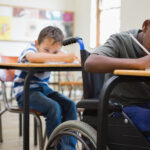With funding from federal, state and local agencies and organizations, we conduct various projects and programs. As a UCCEDD many projects are conducted in partnership with other organizations to improve the lives of those with disabilities.
Select a section below to learn more
Community Living Early Intervention Family Support Health & Wellness Research & PolicyCommunity Living
Be Safe Training
Content to come
Emergency Preparedness
This project provides insight into local hazards and how people living with disabilities can best prepare for them, as well as best practices surrounding disaster preparations and planning. To learn more, contact erica.harris@cchmc.org
Funding Sources: Multiple funding sources
Role: Lead
Law Enforcement
Our aim is to improve the relationships of law enforcement and criminal justice professionals and individuals with developmental disabilities and their family members in Ohio. To learn more contact erica.coleman@cchmc.org.
Funding Sources: Multiple funding sources
Role: Lead/partner
Law Enforcement Disability Awareness Training
Our UCCEDD Senior Engagement Coordinator for Health and Wellness offers training for law enforcement, criminal justice system and EMS on “Interacting with Individuals who have Disabilities.” In collaboration with local police and other partners, we provide an individualized curriculum on how to best interact with people with disabilities in challenging situations. If you are interested in holding a training for your law enforcement officers, please contact Erica Harris at erica.harris@cchmc.org.
Funding Sources: Multiple funding sources
Role: Lead
Project SOAR
Cincinnati Children’s Hospital Medical Center’s “Starting Our Adventure Right” (SOAR) program advances community inclusion for individuals with developmental disabilities and their families. SOAR’s mission is to promote health and well-being for individuals with developmental disabilities by designing and implementing inclusive community opportunities, building accessibility and inclusion capacity, evaluating and continuously improving effectiveness, and sharing accessibility and inclusion research and experiences. Over the past eight years, we have built a reputation as a trusted inclusion resource and fostered effective, collaborative relationships with over 15 community partners. In the spirit of true inclusion, this work has always been driven by the people it serves. We bring together individuals with developmental disabilities and their families, engaged community partners, and disability experts in a collaborative learning process to improve accessibility and model inclusion. In collaboration with individuals with disabilities and their families, this network of partnerships has led a community inclusion movement in Greater Cincinnati. We have increased capacity for inclusion through training and practice for close to 3,000 community organization staff members and hosted over 30,000 people at inclusive community events.
What does SOAR look like?
- Flight rehearsals
- Sensory-friendly performances
- Sensory Saturdays and sensory-friendly events
- Sensory-friendly sporting events
- Specialized programming (e.g., classes, camps, haircuts with behavioral support,etc.)
- Access materials on websites
- On-site accommodations
- Staff training
Dr. Jennifer Smith, Associate Professor of Clinical Pediatrics in the College of Medicine at UC/Cincinnati Children’s and Director of the Leadership Education in Neurodevelopmental and related Disabilities (LEND) Program at Cincinnati Children’s, is the director of SOAR and one of its founders. Dr. Smith builds collaborative relationships with our community partners and families, designs and facilitates all inclusion trainings, and actively directs the coordination and implementation of SOAR community events. Our CCHMC team is recognized as the leader in our community when it comes to community inclusion, often receiving requests from organizations on how to support their access and inclusion initiatives.
“We all belong in Cincinnati!”
The SOAR Program is possible due to generous support from:

Community Partners:

Regional Autism Advisory Council of Southwest Ohio (RAAC)
The Regional Autism Advisory Council of Southwest Ohio (RAAC) connects organizations, individuals, and family members to enhance the autism community by collaborating and sharing knowledge. RAAC brings together members of the autism community so that all people impacted by autism, including individuals with autism, organizations, government, and businesses can work more effectively and efficiently for the autism community. Together we share information, tackle large, complex issues, and foster a community of collaboration to best serve our local neighbors living with autism. While we speak from the lens of autism, much of what is discussed applies across the disability groups. All are welcome. Contact us: raac@cchmc.org
Role: Partner
Supported Decision Making
In 2021, The UCCEDD formed an Ohio Statewide Collaboration to increase awareness and knowledge about supported decision-making as an alternative to more restrictive decision-making supports (guardianship). This collaboration has more than 40 partners to create change in Ohio. Supported decision making makes sure the person with a disability has a support system of other people they can go to if they have questions or need help. This could be family, friends, church groups, doctors, social workers, organizations, etc. If an individual can get help and support from these people to make their own decisions and live independently, then a guardianship might be unnecessary.
More Information Here
Role: Partner
Transition
Transition planning is helping students with disabilities and their families think about their life after high school, including the transition of medical care, financial transition and more. The process helps students identify long-range goals and teaching students how to gain the skills and connections they need to achieve these goals. Transition planning formally begins when a student turns 14 years old, but it is recommended to begin this process early in childhood.
Funding Sources: Multiple funding sources
Role: Lead of Multi-Agency Collaboration
Early Intervention
Early Intervention (EI) provides home-based services for children birth to three years of age, who have, or are at risk of developmental delays or disabilities. Delays can be found in any of the five developmental domains (cognitive, communicative, physical, adaptive, or social/emotional). All children at Cincinnati Children’s who may be at risk of,or who are suspected of having a developmental delay or disability in one of these categories, should be referred to EI to be evaluated for eligibility
Act Early
The Act Early Initiative promotes collaboration among early childhood programs in states and territories so children with autism or other developmental disabilities can be identified early and get the services and support they and their families need.
Child Find
Under the Individuals with Disabilities Education Act (IDEA), states are required to have a process to identify, locate and evaluate children who are at risk of, or who have a suspected developmental delay or disability. The Early Intervention (EI) program fulfills these requirements and services related to identifying children, through what is referred to as Child Find. For more information contact kathryn.wize@cchmc.org
Funding sources: State funded
Tiered Online Training and Support (TOTS) Project
TOTS is a research-driven intervention to support parents of young children with developmental delays or disabilities and challenging behavior through an online support platform. The project team consists of researchers from The University of Oregon and Cincinnati Children’s Hospital who are supported by two family advisory boards, one in Oregon and one in Ohio.
Funding Source: National Institute on Disability, Independent Living, and Rehabilitation Research; Administration for Community Living; United States Health and Human Services
Role: Partner
Family Support
The UCCEDD facilitates and leads many family support activities, workshops, and trainings on topics of importance to families of children and adults with disabilities.
Health, education, and service systems can be extremely challenging for families to navigate and we are here to help.
Babysitter Training
Caring for Children and Youth with Developmental Disabilities Training Course Three times a year (spring, summer and fall), we offer a training course to mature high school and college age students who are interested in caring for children/youth with developmental disabilities. The training that we provide in this course is focused on training babysitters to work with children with disabilities up to the age of 12. Seeking a Sitter? If you are a parent/caregiver interested in obtaining babysitting services, and your child meets the age criteria, please register below. If you are a mature high school/college age student interested in participating in the 5- week course, please register below and we’ll let you know when the next class takes place.
Funding sources: DDBP internal funding source
Role: Lead
Charting the LifeCourse
Charting the LifeCourse™ tools are designed to support families, with all their complexity and diversity, in ways to maximize their capacity, strengths and unique abilities so they can best support, nurture, and facilitate the achievement of self- determination, interdependence, productivity, integration and inclusion in all facets of community life for their family members.
How to use the CtLC tools in challenging times – providing the needed tools to help you and your family get the most out of life despite the everyday challenges.
For more information contact celia.schloemer@cchmc.org
Funding sources: State level funding; Department of Developmental Disabilities Contract through Nisonger Center
Role: Partner
Family Navigation
The UCCEDD believes that all people living with disabilities and their families can be participating members of their communities, living the lives they want. This is not easy and can require support to manage the common barriers often met when trying to lead a healthy, safe, productive and self-determined life. The UCCEDD Family Support Team is here to provide that support.
Funding sources: Maternal and Child Health Bureau Grant T73MC00032 Cincinnati Leadership Education in Neurodevelopmental and Related Disabilities (LEND) program
Role: Partner
Ohio Family 2 Family (F2F)
Ohio F2F provides support, information, and resources to families of children and youth with significant healthcare needs (CYSHCN) so that they receive the best health care and to ensure optimal health outcomes.
Funding sources: Federal funding; Maternal and Child Health Bureau; Health Resources and Services Administration; U.S. Department of Health and Human Services
Role: Lead
Ohio Parent 2 Parent (P2P)
Ohio P2P is a statewide matching program that matches parents, family members, or caregivers of a person with a disability or special healthcare need with an experienced, trained, volunteer support parent.
Funding Source: DDBP internal funding source
Role: Lead
Parenting with a Disability
Whether you are currently a parent with a disability or are an individual with a disability thinking about becoming a parent, there are some extremely helpful resources available to you. It’s empowering to know you have a wealth of support behind you.
- The Disabled Parenting Project (DPP) The Disabled Parenting Project provides ways to connect and interact with other parents with disabilities. The DPP has all the latest about adaptive parenting and is a great resource for all other information relative to parenting with a disability.
- The National Research Center for Parents with Disabilities From The Heller School for Social Policy and Management at Brandeis University, the National Research Center for Parents with Disabilities conducts research and provides training and technical assistance, as well as providing information on a wide array of relevant topics.
Funding Source: NIDILRR
Role: Partner
Rubinstein-Taybi Syndrome (RTS)
The UCCEDD receives funding from the Dr. Jack Rubinstein Foundation to provide resources, support and opportunities for education and recreation for individuals with Rubinstein-Taybi Syndrome and their families. If you would like to learn more about our events and support, contact rts@cchmc.org
Funding Source: DDBP internal funding source
Role: Lead
Health & Wellness
Center for Dignity in Healthcare for People with Disabilities
The purpose of the center is to identify and reduce life-limiting healthcare inequities for people with disabilities.
Funding sources: Administration for Community Living (ACL); United States Health and Human Services (USHHS)
Role: Lead
COVID-19
The Centers for Disease Control and Prevention provides the most up to date information about COVID-19. COVID-19 Initiatives: The purpose of these initiatives are to ensure that people with disabilities and their families have access to accurate and accessible information on COVID-19 and the COVID-19 vaccine.
Funding sources: Multiple federal agencies
Role: Lead
Health Promotion
The UCCEDD engages in various projects to promote health and healthy living for people with intellectual and developmental disabilities in Ohio. For one of those projects, the UCCEDD is a proud partner of the Nisonger Center at The Ohio State University, and the CDC-funded Ohio Disability and Health Program, which works on improving the health of people with mobility limitations and intellectual/developmental disabilities.
Funding sources: Multiple funding sources
Role: Partner
Living Independent From Tobacco (LIFT)
The LIFT program trains professionals on how to work with people with disabilities who want to stop using tobacco. To learn more contact erica.harris@cchmc.org
Funding sources: Centers for Disease Control and Prevention; Contract funding from Nisonger Center
Role: Lead
Next Step Collaborative
Next Step Collaborative is a community coalition of professionals and family members who focus efforts on education, research and advocacy
Mission: Improve outcomes and well-being of children and their families impacted by substance use disorders
Vision: Children and families impacted by substance use disorders will have safe environments and resources to support healthy growth and development
We value:
- Preventing intergenerational substance use disorders;
- Ensuring safe and stable living environments;
- Promoting competent and knowledgeable providers and educators;
- Delivering quality care coordination; Providing stigma-free diagnosis and treatment;
- Supporting children through transition age and into adult care;
- Advancing high-quality, evidence-based research;
- Developing easily accessible resources and information for caregivers
- Expanding societal awareness of and attitudes toward the impact of substance use disorders
Role: Partner
Project SCOPE (Supporting Children of the OPioid Epidemic)
Project SCOPE: Supporting Children of the OPioid Epidemic, is a national training initiative intended to build nationwide provider capacity and confidence in applying evidence-based practices in screening, monitoring, and interdisciplinary support for children and families diagnosed with Neonatal Abstinence Syndrome (NAS), Neonatal Opioid Withdrawal Syndrome (NOWS), or who are suspected of being impacted by opioid use, trauma, or related exposure. The Wyoming Institute for Disabilities partners with the Nisonger Center at The Ohio State University and the University of Cincinnati Center for Excellence in Developmental Disabilities for this project. This initiative will build upon the effective ECHOTM virtual training model and developed for the 2018-2019 pilot supported by the Administration on Intellectual and Developmental Disabilities through the Association of University Centers on Disabilities.

2022 Buckeye SCOPE ECHO Series
Our 2022 series wrapped up in July. For more information about future opportunities or to be added to our Buckeye SCOPE Newsletter, please email stephanie.weber@cchmc.org.
Research & Policy
The UCCEDD empowers people with disabilities to develop self-advocacy skills through a commitment to include the perspectives of individuals with disabilities in every facet of planning, education, and policy development. The UCCEDD also provides training and information dissemination related to policies that may impact individuals with disabilities. We work tirelessly to ensure that the human and legal rights of people with disabilities and their family members are promoted and protected so that we may all benefit from a fully inclusive community.
Disability Research Lab
The UCCEDD is expanding its connection to research with a newly launched Disability Research Lab. The lab, led by Dr. Kara Ayers, began meeting in the fall of 2020 as an initiative to support the development of researchers, students and trainees interested in the study of disability. Most of the researchers in the lab also have disabilities or identify as family members of people with disabilities. This lab aims to support the development of this underrepresented group. Lab members meet bi-weekly. Each member shares updates on their individual projects, often connected to their home universities or programs, and the group is collaborating on a knowledge translation effort to make a recently published academic article more accessible with plain language. If you or someone you know would like to hear more about the lab, email Dr. Ayers at kara.ayers@cchmc.org. Here is a list of publications from the lab
- Misra, A. & Ayers, K. (2022). “More than Medals” Sets the Stage for the Tokyo Paralympics First-of-its-Kind Historical Analysis. Review of Disability Studies: An International Journal, 17(4).
- Ayers, K., & Reed, K. A. (2022). Inspiration Porn and Desperation Porn: Disrupting the Objectification of Disability in Media. In Redefining Disability (pp. 90-101). Brill.
- Ahlers, K. P., Ayers, K. B., Iadarola, S., Hughes, R. B., Lee, H. S., & Williamson, H. J. (2021). Adapting Participatory Action Research to Include Individuals with Intellectual and Developmental Disabilities during the COVID- 19 Global Pandemic. Developmental Disabilities Network Journal, 1(2), 5.
Role: Lead
Policy: How to Call Your Senator and Representative
If you are a person with a disability, a family member, or a professional who works with people with disabilities, your voice is needed as legislators make important decisions related to healthcare. You’ve heard the repeated request to call your elected official. We know that it can seem intimidating and that this may be something you’ve never done before. However, it’s easier than most people realize. Calling is one of the most effective ways to communicate with your representative or Senator. It’s better than social media, email, or letters.
Here’s a quick video to demonstrate what it’s like to make a few of these calls. As seen, it’s not uncommon to get busy signals (keep trying!), voicemail boxes (leave a message!), or a staffer who answers the phone. Staffers keep track of how many calls they get for issues and which positions their official’s constituents seem to support.
Find the phone numbers for your representatives or Senators. Call them daily to let your voice be heard.
Public Policies of Interest
The UCCEDD monitors a number of legislative issues at a local, state, and national level. UCCEDD Policy Briefs are currently under development. The selection of laws, policies, or regulations for these accessible summaries will be based on interest from our CAC (this should link to the CAC page on the new site) members and other members of our community. If you would like to suggest a policy or regulation to be the topic of a UCCEDD Policy Brief, please contact kara.ayers@cchmc.org
Tiered Online Training and Support (TOTS) Project
TOTS is a research-driven intervention to support parents of young children with developmental delays or disabilities and challenging behavior through an online support platform. The project team consists of researchers from The University of Oregon and Cincinnati Children’s Hospital who are supported by two family advisory boards, one in Oregon and one in Ohio.
Funding Source: National Institute on Disability, Independent Living, and Rehabilitation Research; Administration for Community Living; United States Health and Human Services
Role: Partner



